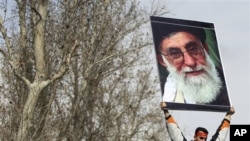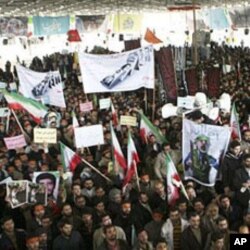Iran's clerical establishment has called for a major rally in Tehran on Friday, to express what it calls its "hatred" of reformists who organized a day of major anti-government protests earlier this week.
In a statement Wednesday, Iran's Islamic Propagation Coordination Council urged Tehran residents to join the rally after Friday prayers to show anger at what it calls the "crimes" of "seditionist" leaders and their rebel allies.
Iranian conservative lawmakers have accused reformist leaders Mir Hossein Mousavi and Mehdi Karroubi of sedition for organizing anti-governments protests that drew thousands of people to the streets of Tehran and other cities Monday. Sedition is a crime punishable by death in Iran.
Iran's chief prosecutor Gholam Hossein Mohseni Ejei said Wednesday he supports calls for the two reformists to be punished.
The opposition leaders issued defiant statements Wednesday, with Karroubi saying he is willing to "pay any price" for his country, while Mousavi called the demonstrations a "great achievement." They had called the protests to show solidarity with recent uprisings in Egypt and Tunisia against authoritarian rulers.
Monday's demonstrations were the biggest in Iran since 2009, when Mousavi and Karroubi led much bigger rallies against the disputed re-election of President Mahmoud Ahmadinejad that year. Mr. Ahmadinejad ridiculed the protest organizers Tuesday, saying they will not achieve their goals.
Iranian authorities say two people were killed in Tehran Monday as police dispersed the protesters. One of the dead was a Tehran University student whom authorities identified as a government-allied Basij militiaman. But opposition activists say the student, Sanee Zhaleh, came from their ranks.
Iranian state television says a memorial ceremony for Zhaleh at Tehran University erupted into fighting between opposition activists and government loyalists. It says the government loyalists forced the opposition activists to leave Wednesday's ceremony by chanting slogans calling for the death of seditionists.
Iran's Supreme Leader Ayatollah Ali Khamenei has praised the revolts in Egypt and Tunisia as an Islamic awakening, akin to the 1979 revolution that ousted Iran's U.S.-backed shah.
Some information for this report was provided by AP, AFP and Reuters.





